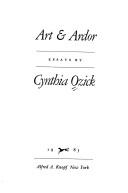Check nearby libraries
Buy this book

Partial Contents: (1) Remembering Maurice Samuels (2) Justice to Feminism.
Check nearby libraries
Buy this book

Previews available in: English
Showing 4 featured editions. View all 4 editions?
| Edition | Availability |
|---|---|
| 1 |
zzzz
Libraries near you:
WorldCat
|
| 2 |
zzzz
Libraries near you:
WorldCat
|
| 3 |
aaaa
Libraries near you:
WorldCat
|
|
4
Art & ardor: essays
1983, Knopf, Distributed by Random House
in English
- 1st ed.
0394530829 9780394530826
|
cccc
Libraries near you:
WorldCat
|
Book Details
Edition Notes
Classifications
The Physical Object
ID Numbers
Source records
Talis recordmarc_openlibraries_sanfranciscopubliclibrary MARC record
Library of Congress MARC record
marc_gtu MARC record
marc_columbia MARC record
harvard_bibliographic_metadata record
Work Description
Cynthia Ozick, the highly praised author of three collections of short stories, is equally admired as a literary critic and essayist. In this collection, the best of her critical work is brought together for the first time - brilliant, impassioned, often polemical essays that consider literature, politics, culture, language, and the myriad ways in which they affect and reflect each other.
Included here are two extraordinary extended essays: one on Edith Wharton, a model of the way one writer of notable fiction can grasp the essential truths about another; and one on Virginia Woolf, in which her relationship with Leonard Woolf is seen as having been both the sustenance of her genius and the shaping influence on his own life: "What he shored up against disintegration was the life he gained - a birthright he paid for by urging porridge between Virginia Woolf's resisting lips." There are a series of relentlessly acute discussions of several of Ozick's contemporaries: John Updike, I. B. Singer (his "phantasmagorical universe of ordeal and mutation and shock is, finally ... the true world we know"), and Truman Capote, whose work is viewed through the prism of "cruel time" revealing "exactly how the world seems to shake off what it does not need, old books, old notions of aesthetics, old mind-forms." There is an ardent defense of and plea for content and moral sense and meaning in fiction, and an exquisite homage to Henry James that includes an exploration of the components of "meaning": "The great voices of Art never mean only Art; they also mean Life, they always mean Life."
In a continuing consideration of Jewish writers and the literature of the Holocaust, Ozick writes about Gershom Scholem, the towering scholar of Jewish mysticism; about Maurice Samuel, Bruno Schulz (who, when he was killed by the Nazis, was "one of the most original literary imaginations of modern Europe"), and Gertrud Kolmar, a reclusive German Jewish poet often compared to Emily Dickinson for "the daring pressure she puts on language." And, in "The Biological Premises of Our Sad Earth-Speck," she speaks of the Holocaust itself - "a slur on a planet given over to life: a disorder that contradicts nature's means and calumniates its ends" - reinvoking both her own and our abhorrence of the event with a singularly moving combination of almost scientific reasoning and tacit outcry.
Finally, there are several personal, controversial pieces about women and politics and art - "women who write with an overriding consciousness that they write as women are engaged not in aspiration toward writing, but chiefly in a politics of sex" - and a beautifully vivid and bittersweet reminiscence about childhood and reading and becoming a writer: "A writer is dreamed and transfigured into being. ..."
In these twenty-four essays, Cynthia Ozick intuits, discovers, and discloses her subjects with a rare intellectual energy and acuity. Art & Ardor clearly demonstrates the broad range and import of this major American writer.
Community Reviews (0)
Feedback?History
- Created November 2, 2008
- 10 revisions
Wikipedia citation
×CloseCopy and paste this code into your Wikipedia page. Need help?
| December 12, 2023 | Edited by MARC Bot | import existing book |
| December 9, 2022 | Edited by MARC Bot | import existing book |
| May 18, 2022 | Edited by MARC Bot | import existing book |
| October 21, 2020 | Edited by MARC Bot | import existing book |
| November 2, 2008 | Created by ImportBot | Imported from Talis record |













